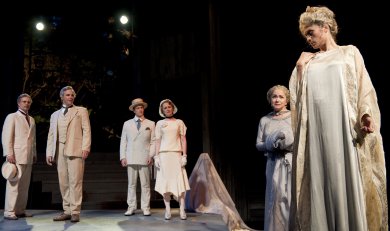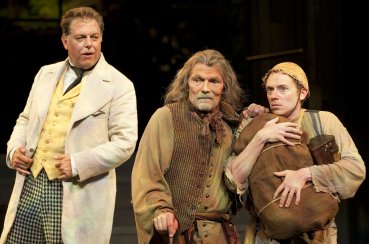Summary 
Produced outdoors and minimally staged, an effective first-act tale of jealousy and anger, driven by a strong lead performance and enhanced by lighting, costume, and incidental music. Colorful second act features comedy and romance and a scene-stealing Autolycus, but as usual for this play, an uneasy overall combination of domestic tragedy and pastoral humor.
Design
Directed by David Frank. Costumes by Robert Morgan. Set by Junghyun Georgia Lee. Lights by Michael A. Peterson. Sound and original music by Fitz Patton.
Cast
Catherine Lynn Davis (Paulina), David Daniel (Leontes), Matt Schwader (Polixenes), Colleen Madden (Hermione), Darragh Kennan (Camillo), Sarah Day (Emilia), Paul Bentzen (Antigonus), Marcus Truschinski (Cleomenes), Andy Truschinksi (Dion), Jonathan Smoots (Shepherd), Brian Mani (Autolycus), Steve Wojtas (Florizel), Tiffany Scott (Perdita).
Analysis
David Frank's outdoor production of The Winter's Tale up the hill at American Players Theatre is appropriately schizophrenic, balancing the razor-sharp Othello-like jealousy of a minimalist first act against the splashy color and As You Like It-romance of the second act.
Frank's only prop, a high-backed wooden chair within a pool of blue light, rests upon a small raked platform. Frank uses subtle musical and lighting changes to enhance the emotions portrayed onstage, but other than the chair being upended to represent a railed witness box during the trial scene, the set remains unchanged.
A chorus-like Paulina begins the production like a storyteller in a memory play, speaking over somber music as the stage lights come up. She returns later, taking some of Hermione's lines as she makes an impassioned plea while cradling the King's newborn daughter, and she also opens the second act, although significantly aged and grayed. At the start, Leontes and Polixenes chatter and horseplay like old friends, wearing the early 20th-century military attire of decorated officers, Polixenes in brash red Bohemian and Leontes - quite appropriately - in Sicilian jealousy green. David Daniel's Leontes dances with Hermione - a sophisticated woman in a navy blue gown and long, formal white gloves, her hair elaborately coiffed - before becoming silly and dancing a step or two while embracing Polixenes.

Daniel's Leontes begins his sudden and dramatic descent toward anger and jealousy after proudly gesturing toward his wife's child-swollen belly. While talking with his son upstage, he begins taking long studying looks at his friend and wife downstage. Soon his words become fearful and distrusting - "art thou...my...calf?" - and in a telling moment, Leontes reaches for Hermione's hand, and she reaches back, but walks past him to grasp Polixenes outstretched hand. The slight inflames Daniel's Leontes, and events quicken - "all is true that is suspected" - into a tragic flurry. A confused Polixenes and Camillo - the latter in a formal tailed tuxedo - unintentionally feed the jealous rage, and Hermione is arrested for treason by black-clad military police officers carrying swords. The trial scene, depicted in stark white light from claustrophobically close on-stage lighting standards, presents a bipolar tour de force for Daniel. Furious but shaken to the core by the imagined injury, his Leontes sputters and shouts, then breaks into a giggle and reproves himself. He struts and rages, but his voice breaks, and he staggers and grasps the metal bars to keep himself from falling. When he storms to center stage carrying his newborn girl, it is with a carelessness that frightens the court, and they half-pursue him in fear for the child's safety. With the arrival of the Oracle - cleverly represented by two tuxedoed real-life brothers - Hermione is brought to the stage manacled and in chains, and slumping with illness. When the indictment is read, Daniel's Leontes thrusts an accusing finger in his wife's face, looms threateningly over her, and shoves her to the ground. When she reaches out to him, he cringes, and after the Oracle is read declaring her innocence he violently refutes it, but she gently touches his face then collapses in his arms. Daniel's manic-depressive star-turn then spins again as he realizes his tragic mistake, and his Leontes almost literally begins to crumble. Paulina rails at him, and he sinks to his knees - crying out "Apollo is angry!" - and he sits on the stage, covering his face - "Pardon!" - and sobbing at the news of the deaths of his son and wife.
Despite the potential for melodrama, Frank maintains a quiet dignity within the scenes, which feature a subtle but evocative musical scoring, and despite some unfortunate wigs - big hair and bushy sideburns - the overall effect is elegantly staged and powerful drama. The first act concludes with a slew of sound effects as Antigonus staggers through a rising storm, the crying princess in his arms, only to flee to the crash of thunder and the echoing growl of an approaching wild animal. Frank's closing moment comes in sudden silence as the storm fully abates, the swaddled child alone in a spotlight onstage.

A colorful but for the most part unfocused second act begins with a group of brightly dressed young country folk emerging upstage carrying large wicker baskets full of fruit. One basket slips and an array of fruit - apples, oranges, lemons, bananas - tumbles down the steps of the platform in a rainbow splash of thumping colors. Upbeat music resounds as the girls in curls, dressed in Bohemian layers like gypsies, cavort upstage, but the appearance of Polixenes and Camillo - now gray-haired and hunched, Camillo leaning on a cane - clearly reveals the passage of time (also indicated by Paulina as storyteller). Brian Mani's outrageous Autolycus - like a dissipated cross between a pirate and a gypsy in a black bandana, yellow-fringed billowy pants and vest, white shoes, a big red tie, a floor-length cape, and an evil mustache - doffs his bright yellow cap and loses his curly-hair wig, stealing every scene in which he appears and energizing the stage. His Autolycus pickpockets passersby, dances with the maidens, and appears to urinate off the upstage platform before following Perdita and Florizel back to Sicilia. The flower-garlanded Perdita, played with vivacious charm, certainly lacks the depth of other Shakespearean heroines, despite her Ophelia-like scene in which she traipses from character to character, offering rosemary for remembrance.
The return to Sicilia is signified with the elegance of stagecraft that defines Frank's first act, as gypsy maidens with wicker baskets stroll the stage and gently loose a fall of red and yellow autumnal leaves. The leaves scatter and whisk across the stage. Frank eschews the supernatural elements of the play's conclusion, even striking a humorous note - an arriving messenger is so smitten with Perdita he can barely speak, much less tear his eyes from her - before focusing on the dramatic reunions. Daniel's Leontes, now also gray-haired and somewhat stooped, appears as though purified, no longer wearing green and black but a bright white business suit. When his son-in-law kneels before him, he kneels in return, a tender moment of forgiveness in a long and explication-heavy scene. Leontes leads the group to the nearly-mystical Paulina, who shows them the darkened stage, with five veiled women in various poses appearing like covered marble statues. The supposed statue of Hermione stands downstage, and Daniel's fatherly smile fades as he beholds the image of his wife. Lit in a hazy blue light and accompanied by a baleful violin, Frank concludes the production tearful reunion. When Hermione moves, the entire cast jumps back, and when she embraces Leontes, he hugs her back. Hermione begins to weep at the sight of her long-lost daughter, her voice breaking so she cannot complete her sentence - but the text, and the production itself of course, leave volumes remaining to be said and explained, so while the moment is poignant, it is nonetheless dramatically unsatisfying. As storyteller Paulina delivers her closing remarks, Frank's elegantly staged production comes to its close.